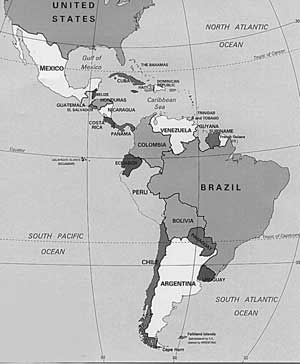Revolution #91, June 10, 2007
The True Story of “The Great Gift Of The Christian Faith To The
Peoples Of This Continent."
Click here for PDF
| 
Latin America |
"I would like to begin with words of thanksgiving
and praise to God for the great gift of the Christian
faith to the peoples of this continent."
-- Pope Benedict XVI, in a speech
to Latin American bishops at Aparecida, Brazil,
May 13, 2007 |
|
|
|
| 
El Potosi, silver mine, Bolivia.
From a seventeenth century engraving. |
| 1) Columbus’
“discovery” of what came to be called
the Americas fueled the development of capitalism
in Europe. Indigenous people who survived the
armies and diseases of the Europeans were forced
to work in tomb-like conditions mining gold that
fueled the growth of capitalism. Later slaves
from Africa were exploited on the plantations
and in the mines of the “new world.”
Karl Marx wrote in Capital: “The
colonial system ripened, like a hot-house, trade
and navigation. The ‘societies Monopolia’
of Luther [early monopolies] were powerful levers
for concentration of capital. The colonies secured
a market for the budding manufactures, and, through
the monopoly of the market, an increased accumulation.
The treasures captured outside Europe by undisguised
looting, enslavement, and murder, floated back
to the mother-country and were there turned into
capital.”
|
|
|
|
| 
Spanish campaign of genocide against
the population of Hispaniola (present-day Haiti
and Dominican Republic) as illustrated by Fray
Bartolome de las Casas.

New World slaves manufacturing
sugar for export to Europe, from a seventeenth
century book Historia Antipodum. |
| 2) Christianity came to the
“new world” as a weapon of conquest.
Backed by guns and swords, Christian missionaries
established systems that incorporated existing
indigenous community organization to serve exploitation
by European capital. |
|
|
|
| 
Indian slaves in the Yucatán haul
supplies for the army of Cortés.

Aztecs dying of smallpox, (Aztec
drawing transcribed by Fray Sahaguns, “The Florintine
Codex”). |
| 3) Many people in the Americas adopted
“the great gift of the Christian faith”
at the point of a gun or sword. Others turned themselves
in to missionaries to be baptized, and accepted
the rule of the colonizers and the church. The story
of why people submitted to Christianity is yet a
further indictment of the role of religion: The
Europeans had developed immunities to the diseases
they brought, diseases that spread very quickly
among the peoples of the Americas who had not been
exposed to them. In his book Disease, Depopulation,
and Culture Change in Northwestern New Spain, 1518-1764,
anthropologist Daniel Reff explains: “The
Jesuits came well prepared with a belief system
to explain why native people suffered from disease.
The thrust of the Jesuit explanation was that the
natives were being punished for their belief in
false gods and for listening to the Jesuits' arch
rivals, the hechiceros [shamans -- Revolution].
This message carried great weight inasmuch as the
Jesuits generally went unscathed during epidemics,
while native priests and shamans suffered along
with other native peoples." Fearing the “god”
who brought all this disease and death, indigenous
peoples in many cases fled to Christian missions
to be converted, hoping for protection from the
Christians’ supposedly more powerful god.
And so, through a combination of the conquistadors'
swords, guns, and disease, and the myth of Christianity,
the peoples of the Americas were enslaved in both
literal and mental chains. |
|
|
|
| 4) “ From the encounter
between that faith and the indigenous peoples,
there has emerged the rich Christian culture of
this Continent, expressed in art, music, literature,
and above all, in the religious traditions and
in the peoples’ whole way of being, united
as they are by a shared history and a shared creed
that give rise to a great underlying harmony.”
(Pope, Brazil, 2007). The “great underlying
harmony,” brought by “Christian culture”
(as a component of the enslavement by capitalism)
manifests today in the teeming shantytowns and
landless peasants, and all the inequality and
oppression that stamps Latin America today. |
|
|
|
| 5) Karl Marx wrote with
bitter irony, “The discovery
of gold and silver in America, the extirpation,
enslavement and entombment in mines of the aboriginal
population, the beginning of the conquest and
looting of the East Indies, the turning of Africa
into a warren for the commercial hunting of black-skins,
signaled the rosy dawn of the era of capitalist
production.” |
|
|
|
Send us your comments.









